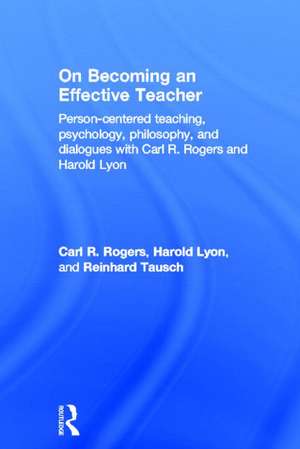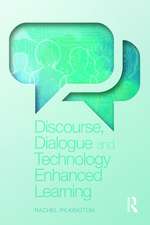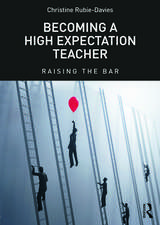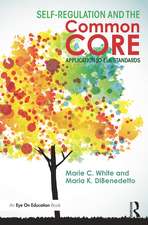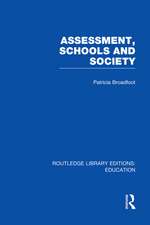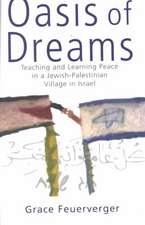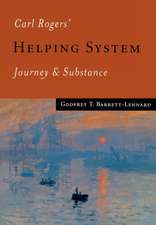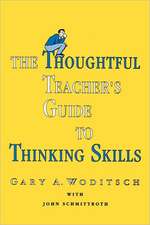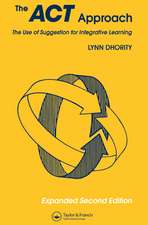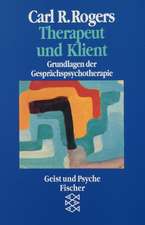On Becoming an Effective Teacher: Person-centered teaching, psychology, philosophy, and dialogues with Carl R. Rogers and Harold Lyon
Autor Carl Rogers, Harold Lyon, Reinhard Tauschen Limba Engleză Hardback – 29 aug 2013
Jeffrey Cornelius-White, Psy.D., LPC, Professor of Counseling, Missouri State University, USA, Author of Learner Centered Instruction: Building Relationships for Student Success
This fascinating book reveals through current research and contemporary applications that Carl Rogers’ pioneering and radical approach to education is as relevant today as it was in the 1970s and ‘80s.
Brian Thorne, University of East Anglia, UK
Carl Rogers is one of the most influential psychologists of the twentieth century. His influence is similarly outstanding in the fields of education, counselling, psychotherapy, conflict resolution, and peace.
On Becoming an Effective Teacher presents the final unpublished writings of Rogers and as such has, not only unique historical value, but also a vital message for today’s educational crises, and can be read as a prescription against violence in our schools. It documents the research results of four highly relevant, related but independent studies which comprise the biggest collection of data ever accumulated to test a person-centred theory in the field of education. This body of comprehensive research on effective teaching was accomplished over a twenty-year period in 42 U.S. States and in six other countries including the UK, Germany, Brazil, Canada, Israel, and Mexico and is highly relevant to the concerns of teachers, psychologists, students, and parents.
The principal findings of the research in this book show that teachers and schools can significantly improve their effectiveness through programs focusing on facilitative interpersonal relationships. Teachers who either naturally have, or are trained to have empathy, genuineness (congruence), and who prize their students (positive regard) create an important level of trust in the classroom and exert significant positive effects on student outcomes including achievement scores, interpersonal functioning, self-concept, attendance, and violence.
The dialogues between Rogers and Lyon offer a unique and timeless perspective on teaching, counselling and learning. The work of Reinhard Tausch on person-centered teaching for counselors, parents, athletics, and even textbook materials, and the empathic interactions of teachers and students, is among the most thorough and rigorous research ever accomplished on the significance and potential of a person-centered approach to teaching and learning.
This pioneering textbook is highly relevant to educational psychologists and researchers, as well as those in undergraduate and graduate university courses in education, teacher training, counseling, psychology and educational psychology.
| Toate formatele și edițiile | Preț | Express |
|---|---|---|
| Paperback (1) | 334.09 lei 3-5 săpt. | +22.85 lei 7-13 zile |
| Taylor & Francis – 22 aug 2013 | 334.09 lei 3-5 săpt. | +22.85 lei 7-13 zile |
| Hardback (1) | 1004.72 lei 6-8 săpt. | |
| Taylor & Francis – 29 aug 2013 | 1004.72 lei 6-8 săpt. |
Preț: 1004.72 lei
Preț vechi: 1225.28 lei
-18% Nou
Puncte Express: 1507
Preț estimativ în valută:
192.26€ • 205.59$ • 160.30£
192.26€ • 205.59$ • 160.30£
Carte tipărită la comandă
Livrare economică 17 aprilie-01 mai
Preluare comenzi: 021 569.72.76
Specificații
ISBN-13: 9780415816977
ISBN-10: 0415816971
Pagini: 288
Ilustrații: 5 b/w images, 11 tables, 4 halftones and 1 line drawing
Dimensiuni: 156 x 234 x 234 mm
Greutate: 0.58 kg
Ediția:New.
Editura: Taylor & Francis
Colecția Routledge
Locul publicării:Oxford, United Kingdom
ISBN-10: 0415816971
Pagini: 288
Ilustrații: 5 b/w images, 11 tables, 4 halftones and 1 line drawing
Dimensiuni: 156 x 234 x 234 mm
Greutate: 0.58 kg
Ediția:New.
Editura: Taylor & Francis
Colecția Routledge
Locul publicării:Oxford, United Kingdom
Public țintă
Postgraduate, Professional, and UndergraduateCuprins
1. Dialogue between Carl Rogers and Harold Lyon; 2. Who wants a Perfect Teacher?; 3. The Man of Tomorrow; 4. Roger’s Man of Tomorrow is Today’s Effective Teacher; 5. Educating the Gifted & Talented: Freedom to Realize; 6. Dialogue between Carl Rogers and Harold Lyon; 7. Listening and being listened to; 8. Facilitating Discovery; 9. Dialogue between Carl Rogers and Harold Lyon; 10. A Course in Person-Centered Psychology at; 11. Person Centered Management and Leadership; 12. Research on Person-Centered Methods; 13. German Research on Person Centered Methods; 14. Students Cry Out for Empathy; 15. Dialogue between Carl Rogers and Harold Lyon; 16. Mentoring; 17. Training Effective Medical Teachers: Current Research which Corroborates Person Centered Methods; 18. Closing Dialogue:
Notă biografică
Harold C. Lyon, Jr. is a graduate of West Point, former US Director of Education for the Gifted, project offi cer for the development of Sesame Street, assistant to the president of Ohio University, has served on the faculties of Georgetown, Antioch, Dartmouth Medical School, Notre Dame College, Universities of Massachusetts, and Munich where he currently teaches physicians to be more effective teachers. He received the Gold Medal in the 32nd International Film & TV Festival of New York, a CINDY Award, and the Blue Ribbon in the American Film & Video Festival.
Reinhard Tausch is Professor Emeritus at the University of Hamburg and is the author of numerous popular books on psychology and teaching.
The Late Carl R. Rogers (1902–1987) has been called ‘the most infl uential psychologist in American history’. His infl uence in the fi elds of education, counseling, psychotherapy, confl ict resolution, and peace is similarly outstanding. The founder of humanistic psychology, he authored 16 books and more than 200 professional articles.
Reinhard Tausch is Professor Emeritus at the University of Hamburg and is the author of numerous popular books on psychology and teaching.
The Late Carl R. Rogers (1902–1987) has been called ‘the most infl uential psychologist in American history’. His infl uence in the fi elds of education, counseling, psychotherapy, confl ict resolution, and peace is similarly outstanding. The founder of humanistic psychology, he authored 16 books and more than 200 professional articles.
Recenzii
"Finally we hear a genuine account of how Carl Rogers work on person-centered education has made and is continuing to make a difference in the lives of students, teachers, and others concerned with the plight of students in today’s increasingly unhealthy school climates and cultures. His views on person-centered education are not only yielding empirically sound empirical results in the US and global school communities but they are inspiring the hope and creativity of students who for too long had no voice. This is a must read for all who care about the plight of today’s children in our increasingly difficult world with few mentors and advocates." - Barbara L. McCombs, Ph.D., Senior Research Scientist and Director, University of Denver
"I finished this book, buzzing with ideas, enthusiasm and hope. Although mid- summer break I found myself wishing I could go in to school tomorrow and share these ideas. I will certainly be leaving a copy in the staff room... I hope the title doesn’t restrict the readership to teachers only. In my view it’s a great source of insight into a person-centred approach for all." - Ruth Moore, Person-Centred Quarterly
"This book may prove interesting to established lecturers wishing to reflect further on how they relate to their students. It could be very useful to those starting out on their lecturing careers. It may be particularly thought-provoking to those not already familiar with the person-centred approach as applied to education." - Tony Ward, Department of Health and Social Sciences, University of the West of England, Bristol, Psychology Learning and Teaching.
Finally we hear a genuine account of how Carl Rogers work on person-centered education has made and is continuing to make a difference in the lives of students, teachers, and others concerned with the plight of students in today’s increasingly unhealthy school climates and cultures. His views on person-centered education are not only yielding empirically sound empirical results in the US and global school communities but they are inspiring the hope and creativity of students who for too long had no voice. This is a must read for all who care about the plight of today’s children in our increasingly difficult world with few mentors and advocates.
Barbara L. McCombs, Ph.D., University of Denver, USA
This fascinating book reveals through current research and contemporary applications that Carl Rogers’ pioneering and radical approach to education is as relevant today as it was in the 1970s and ‘80s.
Brian Thorne, University of East Anglia, UK
"I finished this book, buzzing with ideas, enthusiasm and hope. Although mid- summer break I found myself wishing I could go in to school tomorrow and share these ideas. I will certainly be leaving a copy in the staff room... I hope the title doesn’t restrict the readership to teachers only. In my view it’s a great source of insight into a person-centred approach for all." - Ruth Moore, Person-Centred Quarterly
"This book may prove interesting to established lecturers wishing to reflect further on how they relate to their students. It could be very useful to those starting out on their lecturing careers. It may be particularly thought-provoking to those not already familiar with the person-centred approach as applied to education." - Tony Ward, Department of Health and Social Sciences, University of the West of England, Bristol, Psychology Learning and Teaching.
Finally we hear a genuine account of how Carl Rogers work on person-centered education has made and is continuing to make a difference in the lives of students, teachers, and others concerned with the plight of students in today’s increasingly unhealthy school climates and cultures. His views on person-centered education are not only yielding empirically sound empirical results in the US and global school communities but they are inspiring the hope and creativity of students who for too long had no voice. This is a must read for all who care about the plight of today’s children in our increasingly difficult world with few mentors and advocates.
Barbara L. McCombs, Ph.D., University of Denver, USA
This fascinating book reveals through current research and contemporary applications that Carl Rogers’ pioneering and radical approach to education is as relevant today as it was in the 1970s and ‘80s.
Brian Thorne, University of East Anglia, UK
Descriere
On Becoming an Effective Teacher presents the final unpublished writings of Rogers and as such has, not only unique historical value, but also a vital message for today’s educational crises, and can be read as a prescription against violence in our schools. It documents the research results of four highly relevant, related but independent studies which comprise the biggest collection of data ever accumulated to test a person-centred theory in the field of education. This body of comprehensive research on effective teaching was accomplished over a twenty-year period in 42 U.S. States and in six other countries including the UK, Germany, Brazil, Canada, Israel, and Mexico and is highly relevant to the concerns of teachers, psychologists, students, and parents.
The principal findings of the research in this book show that teachers and schools can significantly improve their effectiveness through programs focusing on facilitative interpersonal relationships. Teachers who either naturally have, or are trained to have empathy, genuineness (congruence), and who prize their students (positive regard) create an important level of trust in the classroom and exert significant positive effects on student outcomes including achievement scores, interpersonal functioning, self-concept, attendance, and violence.
"This book may prove interesting to established lecturers wishing to reflect further on how they relate to their students. It could be very useful to those starting our on their lecturing careers. It may be particularly thought-provoking to those not already familiar with the person-centred approach as applied to education." - Tony Ward, Universtiy of the West of England, PLAT13 (2)
The principal findings of the research in this book show that teachers and schools can significantly improve their effectiveness through programs focusing on facilitative interpersonal relationships. Teachers who either naturally have, or are trained to have empathy, genuineness (congruence), and who prize their students (positive regard) create an important level of trust in the classroom and exert significant positive effects on student outcomes including achievement scores, interpersonal functioning, self-concept, attendance, and violence.
"This book may prove interesting to established lecturers wishing to reflect further on how they relate to their students. It could be very useful to those starting our on their lecturing careers. It may be particularly thought-provoking to those not already familiar with the person-centred approach as applied to education." - Tony Ward, Universtiy of the West of England, PLAT13 (2)
